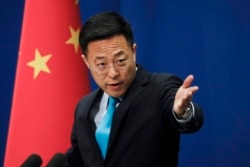The United States on Friday summoned China's ambassador after a senior official in Beijing tweeted the "ridiculous" suggestion that the U.S. military started the COVID-19 pandemic, the State Department said.
David Stilwell, the top U.S. diplomat for Asia, issued a "stern representation" to Ambassador Cui Tiankai a day after foreign ministry spokesman Zhao Lijian tweeted the conspiracy theory.
"China is seeking to deflect criticism for its role in starting a global pandemic and not telling the world," a State Department official said.
"Spreading conspiracy theories is dangerous and ridiculous. We wanted to put the government on notice we won't tolerate it, for the good of the Chinese people and the world," the official said.
Zhao, in tweets in both Mandarin and English that gained wide traction on Chinese social media, a day earlier suggested that "patient zero" in the global pandemic may have come from the United States, not the Chinese city of Wuhan, where cases were first reported in late 2019.
"It might be US army who brought the epidemic to Wuhan. Be transparent! Make public your data! US owe us an explanation," tweeted Zhao, who is known for his provocative statements on social media.
'Wuhan virus'
His comment came as President Donald Trump's administration, which has faced increasing criticism over its own coronavirus response, has been increasingly highlighting the illness' foreign origins, with Secretary of State Mike Pompeo dubbing it the "Wuhan virus."
Cui, in contrast to Zhao, is known for his diplomatic approach. A day before he was summoned, Cui tweeted that China hoped to work closely with the United States to fight COVID-19 for "a more prosperous shared future."
Scientists widely believe that the pandemic started in a market in Wuhan that sold exotic animals for human consumption.
Trump, speaking to reporters to announce a state of emergency over the pandemic, also dismissed the Chinese conspiracy theory when asked about it.
"They know where it came from. We all know where it came from," said Trump, who also voiced confidence that the row would not affect a first-phase deal to resolve a trade war.
Rampant conspiracy theories
Conspiracy theories have been widely disseminated over social media as the novel coronavirus takes a heavy toll worldwide.
U.S. officials earlier told AFP that Russia had systematically spread disinformation in an effort to damage the U.S. reputation, with coordinated Facebook and Twitter posts that suggested that the United States was behind the novel coronavirus.
Russia denied responsibility for the social media effort, which recalled the former Soviet Union's campaign in the 1980s to link HIV to the U.S. government.
Iran's firebrand former president, Mahmoud Ahmadinejad, has written the World Health Organization to urge an investigation into the "biological war against humanity," questioning why U.S. adversaries China and Iran have been so badly hit.
Italy, a close U.S. ally, officially has the most cases of COVID-19 after China.










